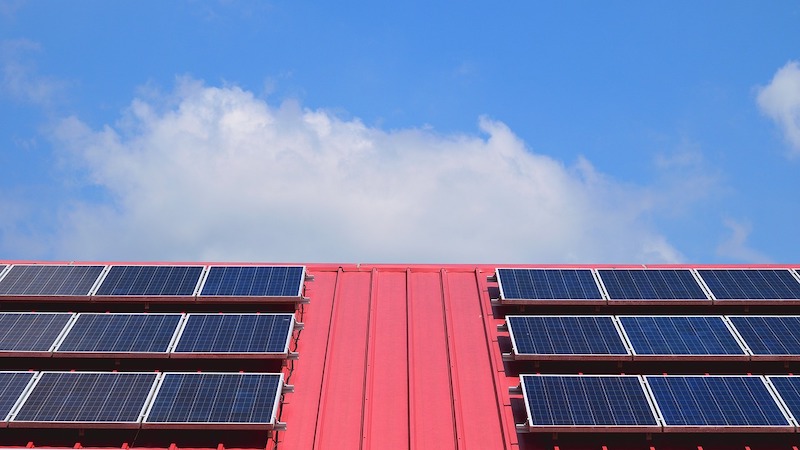A new bill introduced in the Massachusetts Legislature would require that rooftop solar be included on new residential and commercial building projects.
Modeled after a similar policy in California, the bill would provide some exemptions. If the roof is too shaded, if a solar hot water system or other renewable energy technology is installed, or if the building has a green roof, it could be exempted. Affordable housing developments could also obtain exemptions.
According to the bill, amendments to the state’s building code would ensure that roofs are strong enough to support solar panels, that available roof space is maximized, and that buildings can make room for solar infrastructure. Single-family homes would need to produce enough electricity via solar each year to meet 80% of the average demand for similar houses. The state would set minimum solar energy system requirements for other buildings.
A report from an environmental advocacy group found that such a mandate would add more than 2.3 GW of solar capacity by 2045. That’s close to Massachusetts’ current total installed capacity, including utility-scale solar, of about 2.9 GW.
Related Stories
| Oct 11, 2012
OSHA launches pilot program for alternative dispute resolution on whistleblower complaints
The Occupational Safety and Health Administration (OSHA) is launching an alternative dispute resolution (ADR) pilot program for complaints filed with OSHA's Whistleblower Protection Program.
| Oct 11, 2012
Bill promotes investment in commercial, multifamily retrofits
The Commercial Building Modernization Act recently introduced in the Senate would extend and streamline a current tax deduction to encourage commercial and multifamily residential building owners to perform comprehensive energy-efficient retrofits.
| Oct 11, 2012
Morristown, N.Y., settles code violation dispute with Amish
The town of Morristown, N.Y., has dropped charges of building code violations against local Amish communities to settle a First Amendment complaint.
| Oct 11, 2012
Mesquite, Nev., rebels against state-mandated energy code
The city council of Mesquite, Nev., voted against adopting a new energy efficiency code adopted by the state.
| Oct 11, 2012
Bloomingdale, N.J., restricts ground solar and wind energy installations
The borough of Bloomingdale, N.J., recently adopted regulations for solar-energy and wind energy systems.
| Oct 3, 2012
Bill introduced to extend home energy efficiency tax credit
A bill to extend the expired residential energy efficiency tax credit for installing qualified furnaces, boilers, central air conditioners, and heat pumps was recently filed in the U.S. House of Representatives.
| Oct 3, 2012
OSHA publishes more detailed information on variances
The Occupational Safety and Health Administration (OSHA) enhanced its variances Web page to improve public understanding of the variance approval process and increase access to the agency's decisions regarding variance requests.
| Oct 3, 2012
Online program computes energy savings from green roofs; compares savings with other options
A free online tool can calculate the amount of energy savings from installation of a green roof. Portland State University‘s (PSU’s) online Green Roof Energy Calculator can be used for new or old structures.
| Oct 3, 2012
SERF, CSE launch a new accreditation for evaluation of building sustainability
The Society of Environmentally Responsible Facilities (SERF), a Chicago-based environmental building certification organization, and the Centre for Sustainability and Excellence (CSE) launched a new accreditation program that certifies professionals to evaluate buildings’ sustainable systems and practices according to SERF’s certification criteria.
| Oct 3, 2012
New version of Occupied Space Standard for DC microgrids in buildings released
The EMerge Alliance, an association leading the adoption of safe direct-current (DC) power distribution standards for commercial buildings, has updated the EMerge Alliance Occupied Space standard.















